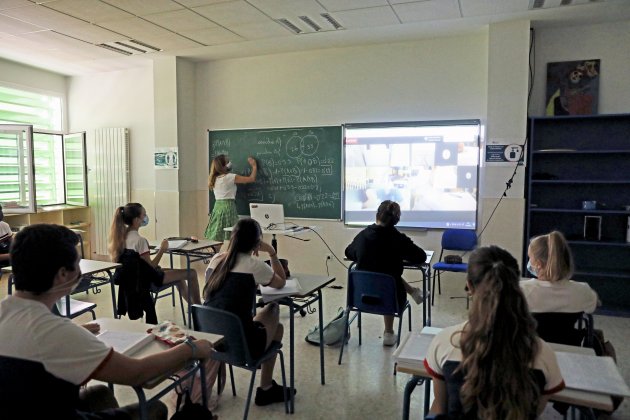Spain's Constitutional Court, newly renewed, is beginning to clear a path to speed up the accumulation of appeals that is has pending review. Indeed, there is a lot of work waiting in the inbox. At the outset, this Tuesday's plenary meeting of the court accepted the voluntary recusal of the progressive judge Laura Díez regarding the Vox party's appeal against the Catalan government's decree which avoided the application of the 25% Spanish language quota in Catalonia's classrooms. The constitutional body rejected the far-right party's arguments the extreme right presented in November of last year but, at this point, the appeal is still alive. The Constitutional Court dismissed the appeal due to a formal error, so that it did not even study the issue in depth.
But why is Díez recusing herself? When the judge was based in Catalonia, and was a member of the Catalan organ to ensure the constitutional compatibility of legislation, the Council of Statutory Guarantees, she drafted an opinion on Catalan language law. She said that Catalan law did not violate two parts of the Constitution, article 3 (that Spanish is the official language of the state and all Spaniards have a duty to know it and the right to use it) and article 27 (which includes the right to freedom of education). Because of these previous positions, the anti-Catalan immersion pressure group Assembly for a Bilingual School sent an appeal to the Constitutional Court to challenge the judge. In any case, she herself opted to abstain.

According to VOX's appeal on the 25% case, the Catalan government's text served to "once again abandon the use of Spanish" in Catalan schools. The party defined the Catalan government action as a "strategy" to give schools a "legal shield" to be able to breach the Catalan High Court (TSJC) ruling, which was one the one that originally ruled for a 25% quota of classroom time in Spanish. In addition, Vox stressed that it was improper for the measure to be approved as a government decree-law because "there was no extraordinary and urgent need" that necessitated the use of this mechanism.
Debate begins on the abortion law
In order to start clearing the huge backlog in Spain's court of guarantees, presiding judge Cándido Conde-Pumpido ordered his colleagues to start debating the PP's appeal against the abortion law approved 13 years ago. To begin with, the court has rejected the abstention by the conservative judge Concepción Espejel from participating in the discussion. She herself had asked for it because she was a member of the General Council of the Judiciary (CGPJ) that issued a report on the law passed by the government of José Luis Rodríguez Zapatero. The court considers that she can take part because it is "more than 12 years" since the CGPJ drafted that legal text which, according to details, did not involve the approval of any ruling and whose content was not sent to the Spanish government.
Former minister Campo, removed from seven cases
At the same plenary session, the Constitutional Court removed the former Socialist minister of justice Juan Carlos Campo from the deliberations over seven pending appeals. In four procedures he was asked to step aside because of his "personal relationship" with the speaker of the Congress of Deputies, the Catalan Socialist politician Meritxell Batet. Thus, he will not be able to take part in the deliberations related to the PP's appeals against the the decision by Congress's Bureau to accept the oaths and adherence to the Constitution by a group of MPs who used alternative formulas in 2019 and 2020. Nor will he be able to say a word in the debate on the request for reports and documents related to the granting of pardons to the nine Catalan political prisoners nor in the discussion about Batet's decision to leave the former Podemos MP Alberto Rodríguez without a seat. Due to his status as a former minister, he must stand down from the decisions on a Spanish government anti-crisis decree, over a point of the Education Law and over measures adopted by the government of Aragon autonomous community.

